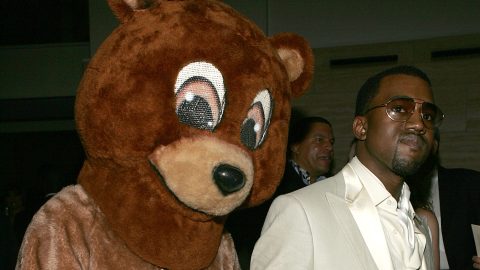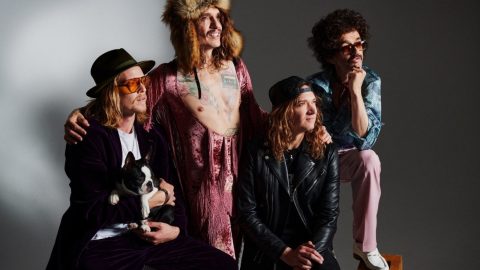“Have you heard the story about…” And that’s how it all begins. Whether we’re imaginative kids attempting to scare one another at sleepovers, or short-sighted Internet historians trying to add some intrigue to late-night conversations, we’ve all been guilty of leaning on half-baked truths in the name of being spooky. But that’s how these kind of stories evolve, that’s how they carry on from one generation to the next, and on a long enough timeline, these macabre tales begin to carry some weight.
That’s certainly the case of the enduring Hollywood stories that haunt Shudder’s Cursed Films. Written and directed by Jay Cheel, this five-part docuseries explores all the myths and legends surrounding your favorite horror movies, from The Exorcist to Poltergeist, The Crow to The Omen. Each episode covers a different title and includes interviews with the film’s cast, directors, and producers, in addition to experts and witnesses for further context, all in an attempt to untangle the facts from the fiction.
The series is currently streaming on Shudder and kicks off a deep dive into the admittedly terrifying behind-the-scenes stories surrounding 1973’s The Exorcist. In anticipation of its release, Consequence of Sound spoke with Cheel a week ago, who discussed the origins of the show, whether he’s a skeptic or a believer, his approach to sensitive material, and what curses truly got under his skin. He also has shares a few bone-tingling recommendations for your quarantine, all of which you can read below.
On the genesis of the series
Well, I was approached by Shudder with the idea, and, for me, it was perfect. I also grew up watching these films, talking about these stories. Poltergeist was a movie that was on heavy rotation in my household. I saw The Exorcist at an age that was probably way too young, but I had parents that were heavy movie watchers. So, it was kind of a perfect match. When I was presented this concept, though, at first I was like, “What do you do with this beyond the Internet listicle version of ‘Isn’t it crazy that this happened? And that happened?'”
And I think, for me, what was most interesting was the idea of digging a little deeper and using these cursed legends as the opportunity to talk about why we’re so fascinated by these stories. And how horror films can unlock supernatural thinking even in the most skeptical viewers, which it does for me. I’m not a religious person, but when I watched The Exorcist, it terrifies me on many levels, and it just leaves me thinking like, How does that work? Why am I so affected by these films? And why is everyone so affected by these films?
And I think it’s no coincidence that a lot of these stories come from the sets of horror films.
On being a Mulder or a Scully

The X-Files (Fox)
I think I’m a Scully, if I’m remembering my X-Files properly. Yes. I’m definitely a skeptic, but I think I went into it with an open mind and definitely someone who understands the value of storytelling, mythology, folklore, and urban legends. Whether or not I am a believer in the curses, I definitely appreciate that people have connected to these films. I’m certainly someone who is equally affected by how crazy some of the coincidences are surrounding the films. I looked at it as a great opportunity to, first off, connect with a lot of filmmakers who were involved with the making of these films, and fellow horror film fans. That was definitely an exciting part of it for me. But also to talk to some people who come at it from the perspective of being believers and engaging them in these conversations and seeing where that led me.
I came out the other side of it thinking, Okay, you know, we don’t know everything in the universe, there are lots of unexplainable things that we don’t have answers for, and I would never want to flat out deny the idea that there are things we can’t comprehend or understand that are behind some of those mysteries. Even so, I definitely still land on the side of the skeptic, which I think is maybe a bit boring, but that’s how it is. We talked to Michael Shermer, who’s a well known skeptic, and it was fun talking to him because, if anything, it reveals the power of horror films because he talks about feeling anxiety and fear and how these films affect him — and he’s the most skeptical person potentially on the face of the earth. So, it just shows the power of these films in this brand of storytelling. And then beyond that, the power of these cursed legends and why they’re perpetuated, why people have so much fun sharing these stories around, I guess, virtual campfires.
On fans willing myths into reality

Some of the most powerful examples of these legends are the ones that kind of mirror the events that happen in the films that these curses came from. Poltergeist is the perfect example. There were rumors of the use of real skeletons on the set, which some people claimed might have cursed the film because of the desecration of human remains. And that mirrors the actual events in the film in which the Freeling family are living in a house that was built on top of a burial ground and are then literally being haunted by skeletons in a pool and shooting up in coffins. And the skeletons that they’re being haunted by are real skeletons. You know, it’s kind of like a crazy meta loop there. I think that sort of connection gives that particular curse a lot of life because it does feel like it’s bleeding off of the screen. And it is exciting to think that the fantasy we’re seeing in the film could be connected to the real world. I think that’s definitely the case.
I did a short documentary called Twisted about a local drive-in — well, it’s local to me — that was hit by a tornado during a screening of Twister. The story is that the tornado hit while the scene in Twister in which a tornado hits a drive-in was playing and the screen tore apart. And it’s been an urban legend around here for quite some time. So, I talked to the people that claimed to have been there when it happened, and I talked to the people who were working at the drive-in theater the night that it happened — and they’re very different stories on one side. You know, people are saying they saw the screen rip apart in front of them, and then the people who worked at the theater said no movies played because they lost power, and the screen that did tear down wasn’t even scheduled to be playing Twister. So, that’s another great example of literally a scene in the film that portrays that actual event that becomes an urban legend surrounding that event. So, I think that definitely gives it a lot of power.
On finding the facts in the fiction

Poltergeist (MGM)
I wouldn’t have been as interested in working on the series if that side of it wasn’t present. The curses themselves are fun, and as we’ve both said, we kind of grew up hearing about them and sharing them. But I think the most compelling thing about the series is being able to talk to some of the visual effects or the special makeup effects artists that worked on these films that were directly involved with some of these events, and how these curses have sort of colored those events and maybe involve them in the story in ways that they don’t necessarily appreciate.
In the Poltergeist episode, I talked to Craig Reardon, who did the special makeup effects on that movie. You know, he’s at the heart of the rumors surrounding the use of real skeletons on the set, and he’s very blunt and honest about his thoughts on those people that attempt to connect his work on the film to the deaths of two young actresses whom he was friends with — he worked with them. So, that was the most important part of the series. But that’s not to confuse this with, you know, this idea of it being a series that’s debunking these legends. That’s not the approach at all. It’s using them as an opportunity to explore these other interesting things about ourselves, and the people that were involved with the stories.
On approaching sensitive material

Poltergeist (MGM)
When I first contacted Craig, it took some back and forth with some agents and some other folks to actually reach him. And when he finally replied, he sent me a long email, ranting against the fact that he had already taken part in a previous documentary series. You know, one of those E! True Hollywood Story things that is the perfect example of what I was hoping to avoid with this show. And he threatened to sue me personally if I even mentioned his name in the show.
So, when I replied to him, I kind of laid out what the intent was and how we were going to approach the material and the fact that I wanted to give him the opportunity to honestly speak about his feelings about the idea of a curse and his actual participation in the making of the film. He quickly changed his tune, and was very interested in taking part in the project because of that angle. And, thankfully, since then, we’ve become friends and text back and forth about our physical media collections. it turned into a nice little relationship there.
But yeah, I mean that was kind of the challenge. You’re in some cases asking people to talk about things that are very tragic and when the show is called Cursed Films, it might be tough for people to understand that we want to approach things in a way that’s sensitive and honest. So, it really took some convincing for some people and that’s the perfect example of that. That probably the most extreme example of that, too. Anyone else, you know, like John Landis, we definitely tried to reach out to him, and we weren’t surprised that we didn’t get an answer on that.
On the most challenging film to tackle

The Omen (20th Century Fox)
Probably The Omen just because the stories are so insane, but there are some real tragedies connected to it. So, it was definitely the one that was the toughest to balance. And also because the connection to the film … like when they were marketing The Omen, they leaned into it a little bit, the story surrounding the making of the film. And I think that Mason Neufeld and Richard Donner, although they acknowledge the tragedy is outside of the making of the film, they also have a sense of playfulness when talking about it. So, I wanted to be able to engage in that playfulness and run with that a little bit, but also make sure it didn’t seem disrespectful.
I also felt that was an opportunity to bring in some of these other voices — our black magicians, witches, warlocks, Satanists, and so on — to talk about the idea of cursing a film. That’s challenging as well because, you know, there is something inherently kind of humorous to some of the material there and the serious tone in which its approached. But I also really was struck by how dedicated these people were to their craft. It was certainly an interesting few days spent filming a ritual in Utah cursing a film. So yeah, I think that was, tonally, the most challenging episode.
On what curses got under his skin
Well, I mean, The Omen definitely has a lot of crazy coincidences connected to it that feel pretty unexplainable. The only thing I can think of is that through so many years of retelling these stories that there must’ve been some additional sweetening of that narrative that has happened, especially coming from mostly storytellers like Richard Donner. Interviewing him, he’s just a great storyteller, and was so nice. I just wanted to hang out all day with them. I can’t even imagine. But still, that’s a creepy one,
But, I think for me… I actually edited the show, and I was cutting it in my basement, and The Exorcist is still a film that affects me. I still find it to be unsettling. So, when I’m going through the film and trying to find clips for this series, trying to find the creepiest moments, it still affected me. You know, it’s still kind of an unsettling. I remember looking through the scene where Father Karras is in the audio room, and he’s playing back the recording that he made of Reagan talking in reverse. That scene is really unsettling, and that affected me. That’s where I start calling my cats into the room. “Guys, come in, come keep me company.”
I’ve always been affected by that and had this curiosity about real exorcisms. I’ve always wanted to film real exorcisms, and we did that for the Exorcist episode. We have a segment where we actually followed an exorcist and witnessed some of his work. And that was quite the experience. I wouldn’t say that I was afraid at any point, but it was certainly unsettling on levels that I didn’t expect at all.
On a second run of Cursed Films

We covered a lot of the big ones with this series, but there are definitely some films left to explore. And I think there are some films that are on the periphery of the genre that, you know, I think are worth looking at as well, where maybe the films themselves aren’t horror films, but some of the events connected to them are horrific. We had a list of movies that, off the top, we always knew had to be a part of the series, but there were some that we were juggling and I could always see us returning to some of those films and digging into them. And for me, as long as there’s an interesting story beyond the curse, and we’re able to access some people — interesting characters, for lack of a better word — to speak on the subject and reveal something honest about the making of these films, then I would always be interested in exploring that.
On his own self-quarantining
Well, I’m working from home, thankfully, so I’m trying to spend the majority of my day being, you know, productive. But when I’m not, I am watching a lot of movies. I just watched Viy, which is a Russian horror film that’s available on Shudder right now. It’s from 1967. It’s a Russian horror film that’s very simply told. It’s a story of a group of seminary students who end up at a farm house and encounter a witch and it goes from there. Apparently, it’s based on the same source material that Mario Bava’s Black Sunday was very loosely based on, and I’m a big Mario Bava fan, so I just watched that this week and it blew me away. And on the Criterion Channel, they have a program of German Expressionists films, silent films, and I just watched The Golem. That was amazing. I had not seen that previously, and it’s not necessarily horror, but it does get into a Frankenstein realm. I would highly recommend people seek that out, as well.
Exorcists, Poltergeists, and Omens: Director Jay Cheel on the Cursed Films That Made Him Shudder
Michael Roffman






